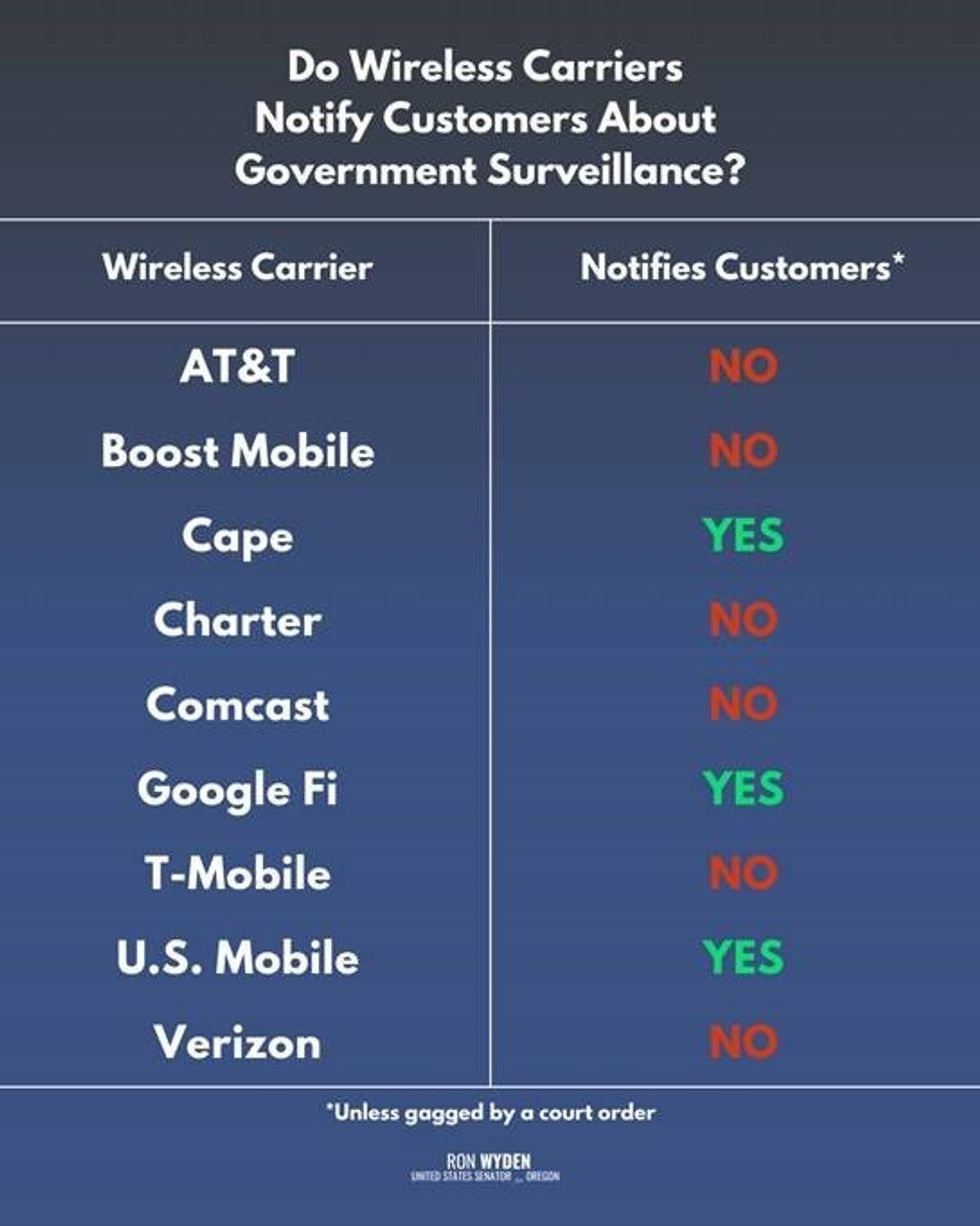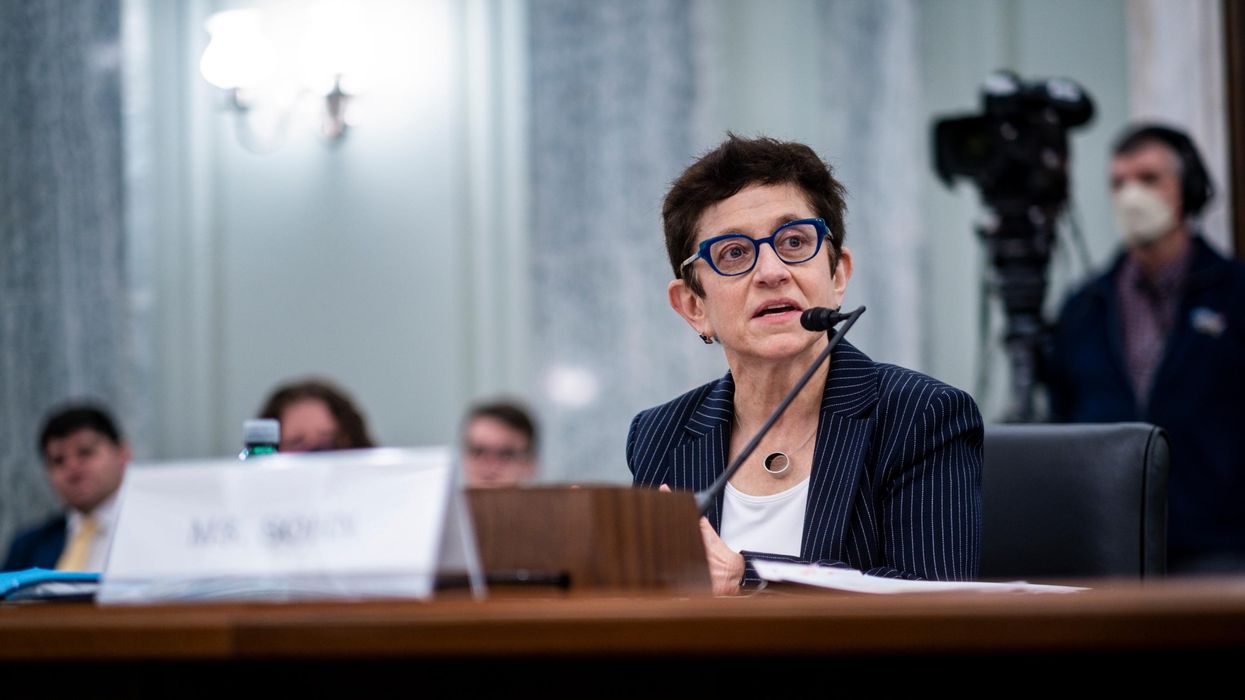Wyden Exposes Which Phone Carriers Don't Notify Customers About Government Surveillance
The Oregon Democrat also informed colleagues of his staff's findings that "senators have been kept in the dark about executive branch surveillance of Senate phones," in apparent violation of companies' contracts.
U.S. Sen. Ron Wyden shared the results of his staff's probe into major phone companies in a Wednesday letter to congressional colleagues and also publicly highlighted which carriers disclose government spying to their customers.
"An investigation by my staff revealed that until recently, senators have been kept in the dark about executive branch surveillance of Senate phones, because the three major phone carriers—AT&T, Verizon, and T-Mobile—failed to establish systems to notify offices about surveillance requests, as required by their Senate contracts," states the letter, published on Wyden's (D-Ore.) congressional website.
"While now rectified for Senate-funded lines, significant gaps remain, especially for the campaign and personal phones used by most senators. I urge your support for legislative changes to allow the sergeant at arms (SAA) to protect senators' phones and accounts from cyber threats, both foreign and domestic," he wrote. "I also urge you to consider switching your campaign and personal phone lines to other carriers that will provide notice of government surveillance."
Wyden noted that "while AT&T and Verizon only provide notice of surveillance of phone lines paid for by the Senate, T-Mobile has informed my staff that it will provide notice for senators' campaign or personal lines flagged as such by the SAA. Three other carriers—Google Fi Wireless, U.S. Mobile, and Cape—have policies of notifying all customers about government demands whenever they are allowed to do so. The latter two companies adopted these policies after outreach from my office."
In a Wednesday statement announcing the letter and the above chart, Wyden's office warned that "beyond members of Congress, journalists, political activists, people seeking reproductive healthcare, and other law-abiding Americans who could be targeted by the government all have reason to be concerned about secret surveillance of their communications and location data."
The findings of his staff include details relevant to every American with a cellphone, but much of Wyden's letter is focused on improving protections for lawmakers. He pointed to "two troubling incidents" that "highlight the vulnerability of Senate communications" to foreign adversaries and U.S. law enforcement: Chinese Salt Typhoon hackers and the U.S. Department of Justice, during the first Trump administration, both collected records of lawmakers and their staff.
"Executive branch surveillance poses a significant threat to the Senate's independence and the foundational principle of separation of powers," Wyden argued. "If law enforcement officials, whether at the federal, state, or even local level, can secretly obtain senators' location data or call histories, our ability to perform our constitutional duties is severely threatened."
"This kind of unchecked surveillance can chill critical oversight activities, undermine confidential communications essential for legislative deliberations, and ultimately erode the legislative branch's co-equal status," he continued. Wyden called on senators to support his proposals for the next annual appropriations bill "that would allow the SAA to protect senators' phones and accounts—whether official, campaign, or personal—against cyber threats, just as we have for executive branch employees."
The longtime privacy advocate's letter to fellow senators was first reported by Politico, which noted that T-Mobile did not immediately respond to requests for comment while spokespeople for AT&T and Verizon defended their companies.
"We are complying with our obligations to the Senate sergeant at arms," AT&T spokesperson Alex Byers said in a statement to the outlet. "We have received no legal demands regarding Senate offices under the current contract, which began last June."
Verizon spokesperson Richard Young told Politico that "we respect the senator's view that providers should give notice to senators if we receive legal process regarding their use of their personal devices, but disagree with his policy position."
Meanwhile, Sean Vitka, executive director of Demand Progress—an advocacy group long critical of government spying on lawmakers and warrantless surveillance—said in response to the revelations from Wyden's office that "we now know that Comcast, Verizon, T-Mobile, and other phone companies have followed AT&T's unprecedented efforts to facilitate secret government surveillance of their own customers, with some even allowing the government to secretly spy on senators."
"This is a bright, red warning sign at a time when the Trump administration keeps blowing past constitutional checks on executive power and is siccing the Justice Department on elected lawmakers," Vitka added. "These companies should be shamed and ashamed until they fix this."





